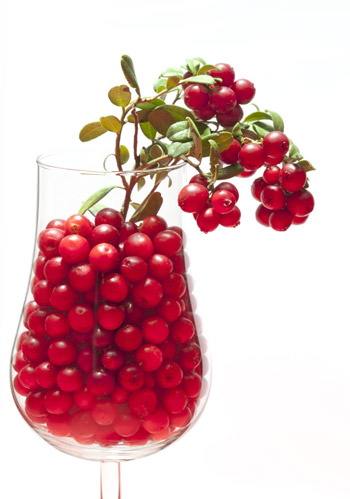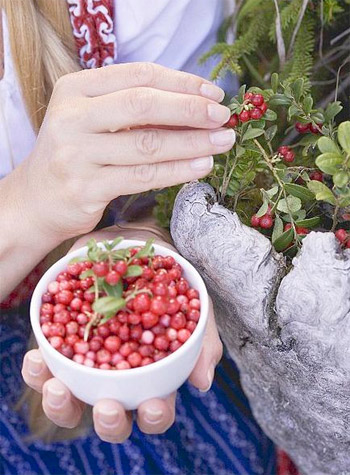|
|
|
 , ,
Font size |
Encyclopedia of Health Benefits of Berries

18. Ligon Berries:
They are also called cowberries, foxberries, and mountain cranberries that
are red in color. It is used to make ligon berry jam, juice, syrup, compote,
sauce, etc. It is rich in vitamin C, provitamin A, vitamin B (B1, B2, B3),
potassium, calcium, magnesium, and phosphorous.
Lingonberries or vaccinium vitis-idaea, are red tart berries that flock the
wild shrubs of Scandinavia and form an indispensable part of Nordic cuisine.
These little-known distant cousins of cranberry fruit are much smaller and
juicier than their other berry counterparts and are a potent source of
preservatives and pectins. Known for their lovely appearance and bright
color, these yummy-looking berries have a bitter taste and are best enjoyed
as sweetened jams and other gourmet food. Also popular as cowberry, rock
cranberry, foxberry and even whimberry, lingonberries come packed with
copious nutritive and therapeutic benefits. Lingonberries are potent bearers
of essential vitamins, minerals, acids and are treated as an antizyme. They
are known to benefit anyone suffering from high blood pressure, poor
digestion, frail metabolism and infections. To know more on the essential
health benefits of this tangy red berry, read on.
Nutrition Benefits of Eating Lingonberry
Lingonberry, affectionately referred as the �Queen of Berries' has a nice
refreshing taste and is known to boost up the appetite. This wild berry
comes packed with a bevy of health and nutritive benefits and is known to
profit human health in more ways than one.
Lingonberry is highly esteemed in the medicinal world for its diverse
spectrum of therapeutic actions. Lingonberry serves both as a diuretic and
choleretic and is known to strengthen capillary tube too. The berries are
treated as carditonic and hypotensive too.
The pearly red lingonberries are supposedly one of the richest sources of
polyphenols. Lingonberries contain berry biocomplex that is believed to have
an anti-sclerotic effect. They are also believed to be a rich source of
copper, an essential mineral that helps in treating pancreatic diabetes.
Lingonberry is a popular cure for liver ailments, gastritis, hypertony and
gastric ulcer. Its capacity to regulate salt metabolism makes it an
effective remedy for treating diseases like renal lithiasis, uratic
arthritis and rheumatism. Lingonberry also has antiseptic properties and can
be used as an astringent too.
Lingonberry contains tannins that help to boost the blood vessel walls,
resolve mineral metabolism and neutralize toxins, thereby improving
digestion and toning up the body.
Lingonberries are touted as excellent cure for urinary tract infections.
These pearly red, ripe berries are found to contain short-chained
proanthocyans that is believed to keep away the infection causing bacteria
from sticking to the bladder wall. Lingonberry juice when taken along with
cranberry juice regularly is likely to reduce the risk of urinary tract
infection in women by forty percent.
These small berries are believed to be excellent source of vitamin A, B and
C and are power-packed with other essential nutrients like calcium,
magnesium, phosphorus, sodium and potassium. Because of their rich
nutritional value, lingonberries are believed to favor both blood and bone
health.
Apart from being rich in essential nutrients, these humble berries are a
rich source of Omega-3 fatty acids. Lingonberries are also found to be a
potent source of essential fatty acids and are highly esteemed because of
their anti-oxidant and anti-inflammatory benefits. Regular consumption of
lingonberries keeps the free radicals from spreading in the body.
Lingonberries, just like their better-known cranberry cousins, are a
storehouse of flavonoids, especially quercetin. Apart from having
anti-inflammatory and antioxidant properties, quercetin has antihistamine
properties that help to alleviate allergy symptoms.
Like most other berries, lingonberries are known to boost the levels of good
cholesterol, improve blood pressure. They are thereby held as a productive
source of heart health.
Animal studies have shown how the lingonberry can lower inflammatory
molecules, block oxidants from destroying tissue, and also help the body
replace important antioxidants, like glutathione, which is a master
antioxidant in our body. Lingonberry has also been shown to increase red
blood cell and liver enzymes needed for antioxidant protection. We need
antioxidants to protect vessels and nerve tissue, and also to help decrease
the damage from inflammation. Proanthocyanidin extracts from lingonberries
were also found to be effective against the bacteria Staphylococcus aureus,
which can cause a wide variety of infections.
Lingonberry Health Benefits
 Lingonberry contains quercetin, it may have a lot of health benefits. And,
here we highlight a few potential lingonberry Lingonberry contains quercetin, it may have a lot of health benefits. And,
here we highlight a few potential lingonberry
benefits:
Antioxidant / Anti-cancer cells activity of lingonberry
Lingonberry has been shown to contain high antioxidant activity. Researchers
isolated six tannins from linonberry. and found that cinnamtannin B1
displayed the strongest anti-lipid peroxidation activity, proanthocyanidin
A-1 displayed the strongest superoxide scavenging activity, and epicatechin-(4beta-->
6)-epicatechin-(4beta-->8, 2beta-->O--> 7)-catechin had the strongest
anti-superoxide formation effect. And, crude extracts of lingonberry were
able to inhibit ornithine decarboxylase activity. The proanthocyanidin
fraction of lingonberry exhibited anticarcinogenic activity. Researchers
from U.S. Department of Agriculture reported that lingonberries contained
potent free radical scavenging activities for DPPH*, ROO*, *OH, and O2*-
radicals. They further reported that lingonberry extract was able to
suppress TPA-induced neoplastic transformation of JB6 P(+) mice cells and
lingonberry extract could also induce apoptosis (death) of human leukemia
HL-60 cells in a dose-independent manner. Thus, lingonberry may benefit
people at risk of certain cancers, but more studies are needed to prove this
idea.
Lingonberry's antimicrobial effects and its effect on urinary tract
infection Lingonberry may benefit people suffered from certain infections.
In a study, six tannins from lingonberry showed anti-microbial activities
and epicatechin-(4beta-->8)-epicatechin-(4beta-->8, 2beta-->O-->7)-catechin
had a strong antimicrobial activity against P. gingivalis and P.
intermedia, but not A. actinomycetemcomitans. While, the other tannins
tested did not show antimicrobial activity. In a separated study, scientists
recruited 150 women with rinary tract infection caused by Escherichia coli
and they served them with 50 ml of cranberry-lingonberry juice concentrate
daily for six months or 100 ml of lactobacillus drink five days a week for
one year, or no intervention. They found a 20% reduction in absolute risk in
the cranberry-lingonberry group compared with the control group.
Next..
Dated 12 March 2013

|
|
|
|
|
|
|









